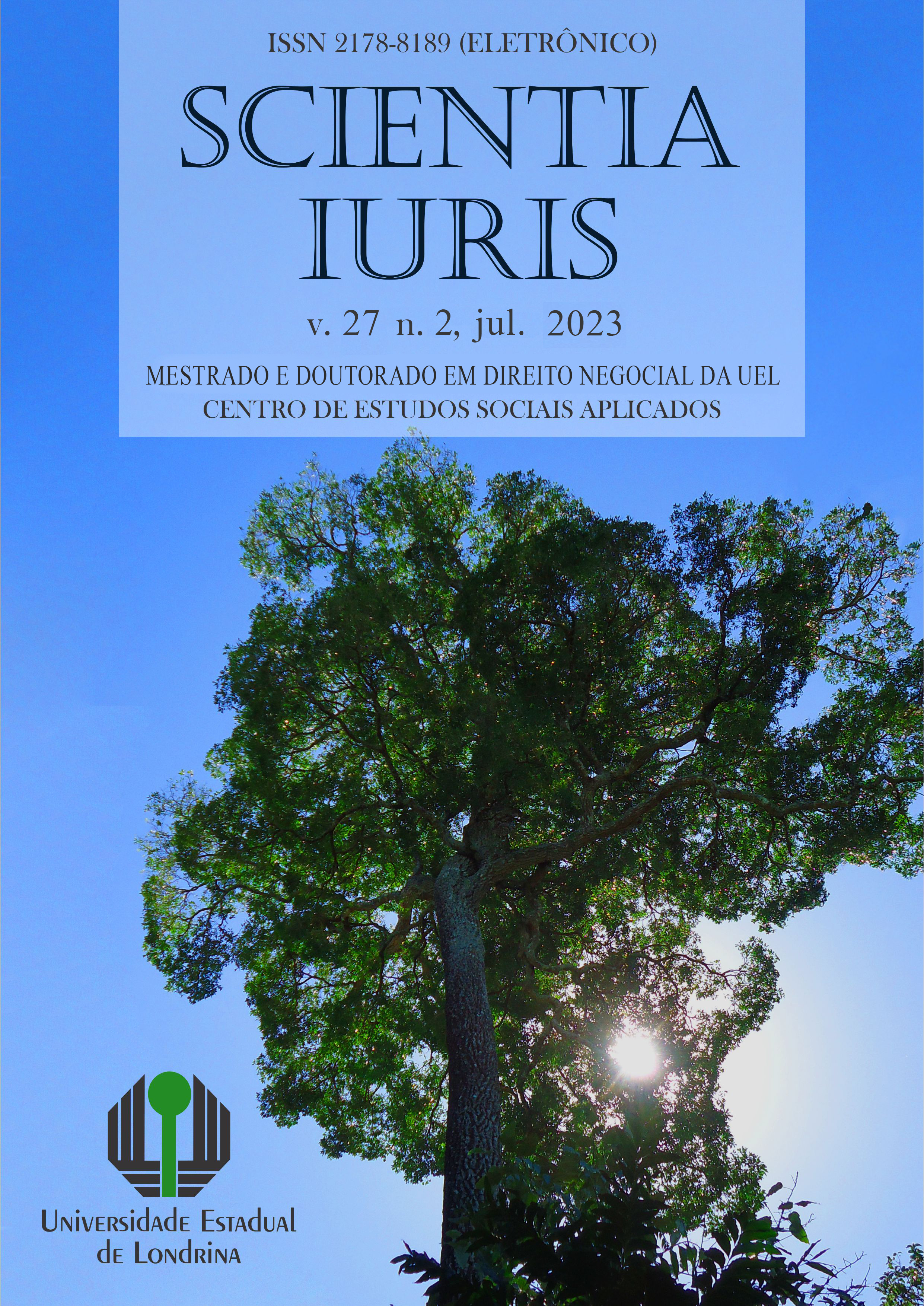The anticipated usufruct of property by the heir during the judicial inventory: controversial points of the paragraph of article 647 of the civil procedure Code
DOI:
https://doi.org/10.5433/2178-8189.2023v27n2p151-169Keywords:
Interim protection. Judicial inventory. Anticipate usufruct of property. Art. 647 of the Code of Civil Procedure.Abstract
This research aims to analyze the normative formulation of the paragraph of art. 647 of the Code of Civil Procedure, to clarify the main controversial points about the nature of the summary protection provided for therein and its application within the scope of the judicial inventory. A qualitative approach was used as a method, through exploratory analysis of bibliography and judgments of Courts of Justice and the Superior Court of Justice. The research demonstrates the way in which the rules of the material legal order dialogue with the civil process and present the contours of procedural and jurisdictional techniques. At the end, the research analyzes the practical consequences of each of the controversial points, especially regarding the part of the beneficiary heir.
Downloads
References
BRITO, Anne Lacerda de. Análise do parágrafo único do artigo 647 do CPC/15: natureza jurídica e requisitos do usufruto antecipado de bens no inventário e partilha. In: BRITO, Anne Lacerda de; JULIÃO, Gustavo Lyrio (coord.). Reflexões sobre o código de processo civil de 2015. Rio de Janeiro: Lumen Juris, 2018.
BUENO, Cassio Scarpinella (coord.). Comentários ao código de processo civil [livro eletrônico]. vol. 3. São Paulo: Saraiva, 2017.
BUENO, Cassio Scarpinella. Curso sistematizado de direito processual civil: teoria geral do direito processual civil. vol.1. 11. ed. São Paulo: Saraiva, 2021.
CÂMARA, Alexandre Freitas. O novo processo civil brasileiro. 7. ed. São Paulo: Atlas, 2021.
DINAMARCO, Cândido Rangel. A instrumentalidade do processo. 15. ed. São Paulo: Malheiros, 2013.
DIDIER JUNIOR Fredie. Curso de direito processual civil: introdução ao direito processual civil, parte geral e processo de conhecimento. 19. ed. Salvador: JusPodiuvm, 2017.
LAMY, Eduardo. Tutela provisória. São Paulo: Atlas, 2018.
LUCCA, Rodrigo Ramina de. In: WAMBIER, Teresa Arruda Alvim; DIDIER JUNIOR, Fredie; TALAMINI, Eduardo; DANTAS, Bruno (coord.). Breves comentários ao novo Código de Processo Civil. São Paulo: Revista dos Tribunais, 2015.
MAZINI, Paulo Guilherme. Tutela da evidência: perfil funcional e atuação do juiz à luz dos direitos fundamentais do processo. São Paulo: Almedina, 2020.
MARCATO, Antonio Carlos. Procedimentos especiais. São Paulo: Atlas, 2021.
MARINONI, Luiz Guilherme. Antecipação da tutela. 12. ed. São Paulo: Revista dos Tribunais, 2011.
MITIDIERO, Daniel Francisco. Tendências em matéria de tutela sumária: da tutela cautelar à técnica antecipatória. Revista de Processo, v. 36, n. 197, p. 27-66, jul., 2011.
NERY JUNIOR, Nelson; NERY, Rosa Maria de Andrade. Código de Processo Civil comentado [livro eletrônico]. 3. ed. São Paulo: Thomson Reuters Brasil, 2018.
NEVARES, Ana Luiza Maia. As inovações do Código de Processo Civil no Direito das Sucessões. In: Anais do X Congresso de Direito de Família - Famílias nossas de cada dia. Instituto Brasileiro de Direito de Família - IBDFAM, pp. 141-183, 2015.
NEVES, Daniel Amorim Assumpção. Novo Código de Processo Civil comentado. Salvador: JusPodivm, 2016.
SILVA, Ricardo Alexandre da; LAMY, Eduardo. Comentários ao Código de Processo Civil: artigos 539 ao 673. Vol. IX (coords.: Sérgio Cruz Arenhart e Daniel Mitidiero). São Paulo: Revista dos Tribunais, 2016.
TUCCI, José Rogério Cruz e. Tempo de processo: uma análise empírica das repercussões do tempo na fenomenologia processual (civil e penal). São Paulo: Revista dos Tribunais, 1997.
THEODORO JUNIOR, Humberto. Curso de direito processual civil. vol.1. 62. ed. Rio de Janeiro: Forense, 2021.
Downloads
Published
How to Cite
Issue
Section
License
Copyright (c) 2023 Gilberto Fachetti Silvestre, Eduardo Figueiredo Simões

This work is licensed under a Creative Commons Attribution 4.0 International License.
The journal reserves the right to modify, in the original text of the submitted article, normative, spelling and grammatical mistakes in order to maintain the cultured standard of language and the credibility of the journal. The journal will respect the authors' writing style. Changes, corrections or suggestions of conceptual order will be sent to the authors, when necessary. In such cases, the articles will be re-examined. The final exams will not be sent to the authors. The published works become the property of the journal, in other words, its total or partial reprinting is subject to the express authorization of the journal. In all subsequent citations, the original source of publication shall be cited and in the case of Photographic Speeches, shall be approved by the original author. The opinions expressed by the authors of the journal's articles are of their sole responsibility.

















